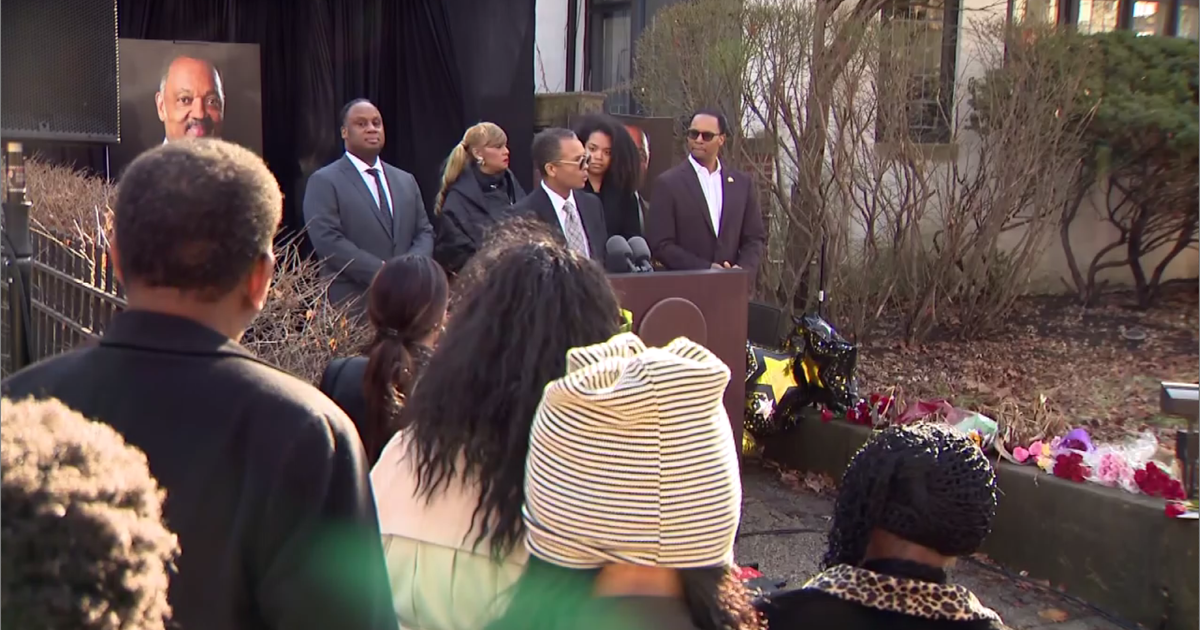Jackson Jr. Being Treated For 'Mood Disorder'
UPDATED 07/12/12 11:25 a.m.
CHICAGO (CBS) -- The mystery surrounding U.S. Rep. Jesse Jackson Jr.'s monthlong absence from Congress deepened Wednesday evening, as his office released a statement saying he is suffering from a "mood disorder," without providing any specifics.
Jackson's aides initially said his leave of absence was the result of "exhaustion," then later said he was suffering "certain physical and emotional ailments."
After rumors began to swirl that he was being treated for alcohol or substance abuse, Jackson spokesman Frank Watkins sent out an email denying those rumors, and stating his doctors are treating him for an unspecified "mood disorder."
"Information regarding the Congressman's treatment is protected by federal law under the privacy provisions of the Health Insurance Portability and Accountability Act of 1996 ("HIPAA"). The name of the attending physician and treatment center will not be disclosed in order to protect his continuing privacy," Watkins said in an email.
"His physician makes the following statement: 'The Congressman is receiving intensive medical treatment at a residential treatment facility for a mood disorder. He is responding positively to treatment and is expected to make a full recovery,'" Watkins added.
WALTER JACOBSON'S PERSPECTIVE: Jesse Wants His Privacy, We Want Answers
However, the statement did not explain what specific type of mood order it is, nor what caused the disorder, although Watkins denied rumors that Jackson is being treated for alcohol or substance abuse.
Asked to speak about the latest revelations for the second time Thursday, the Congressman's father, the Rev. Jesse Jackson, also offered few specifics as he talked to reporters at the Chicago Hilton and Towers for the annual convention of the Rainbow/PUSH Coalition.
"He is unwell. He is under medical supervision. He is rebuilding his strength," the Rev. Jackson said. "We feel good about his regaining of his strength."
Meanwhile, on Thursday, in the absence of details about Jackson's mood disorder, CBS 2 Chief Correspondent Jay Levine went to Rush University Medical Center's chief of psychiatry, Dr. Mark Pollack.
"Typically, people go in-patient for more serious levels of depression, or manic-depression," Pollack said. "Fifteen percent of people with severe levels of depression end up killing themselves, so it can be quite that serious."
Mood disorders can include clinical depression, or bipolar mood swings; and even though Jackson's spokesman said the congressman is not being treated for alcohol or substance abuse, both are listed as potential causes of mood disorders.
"In some cases, patients who are depressed or have bipolar disorder may drink … or use drugs in an attempt to medicate their symptoms, to make themselves feel better," Pollack said. "In other cases, high levels of drug or alcohol use will cause mood disturbance. And, for some, it probably represents some underlying predisposition that gets expressed as both mood disturbance and alcohol or drugs."
Doctors say about 20 percent of us suffer from significant disorders, and help is available.
On the CBS 2 Morning News Thursday, psychiatrist Dr. Mitchell Glaser said hospitalizations are not uncommon for people with mood disorders, although commitment to a hospital does indicate that the situation is serious.
"In my practice and within the treatment of mood disorders in general, we frequently see at least one hospital admission in someone's lifetime," Glaser said.
But Glaser said Jackson may have elected for hospitalization sooner than the average person.
"Now, Congressman Jackson is in the public eye, and frequently, it's kind of hard for him to get away and be able to relax and concentrate on his own needs, because a politician is frequently having to deal with the needs of his constituents. That can be very distressing," Glaser said. "So in his case, it is possible that his condition is milder than most people's that need to hospitalized, just in order for him to get away and get out of the public eye."
Hospitalization for a mood disorder usually involves therapy – often including individual, group and family therapy, Glaser said. Medication may also be administered.
But specifics of Jackson's case remain unknown. At least one source close to Jackson had previously said the congressman is suffering from "persistent sleep disorder," although Watkins' statement made no mention of sleeping problems.
Despite growing pressure from the media and fellow members of Congress, Jackson's family until Thursday remained tight-lipped about the specifics of the medical and emotional issues that have kept him off the job for more than a month.
Levine reports that those closest to Jackson had been urging his doctors in Chicago to say something soon. One source close to Jackson said aides are "urging doctors to make a statement" about what he described as Jackson's "persistent sleep disorder," which has been made worse by the "pressure of political life."
The source also said Jackson might not return to work until after Labor Day.
WBBM Newsradio's Steve Miller made an earlier attempt to talk the Rev. Jackson about his son, but that time, the elder Jackson refused to answer questions about his son's condition
Asked to comment on his son's condition during a luncheon at the hotel during the same Rainbow/PUSH convention, the elder Jackson said Wednesday, "This is inappropriate. This is a business dinner."
LISTEN: WBBM Newsradio's Steve Miller reports
Podcast
Afterward, Rev. Jackson again refused to speak to reporters about his son's health as he and his entourage exited through the hotel kitchen, repeatedly saying no when asked to tell people what he's heard about Jackson Jr.'s condition. He only addressed the issue a day later.
Earlier, former U.S. Sen. Roland Burris had an earful for reporters asking about Congressman Jackson's medical condition.
"I've got enough seniority around here to tell you media people to cool it. You did it to me, now you're going to try to do this to Jesse Jr.," Burris said, in apparent reference to reporters' questions about his appointment to the U.S. Senate by then Gov. Rod Blagojevich, shortly after his arrest for trying to sell that Senate appointment.
"You're just hounding people. You ought to get a life," Burris added, saying reporters were acting like a "wolf pack."
Jackson's office announced on June 25 that he had been on a leave of absence since June 10 due to "exhaustion," then last week, spokesman Frank Watkins said Jackson's medical condition was more serious than first believed.
"Recently, we have been made aware that he has grappled with certain physical and emotional ailments privately for a long period of time," Watkins said in an email last week.
Jackson's aides have not disclosed whether he is being treated in Chicago, in Washington, D.C., or at another location.
Burris acknowledged Jackson's constituents have a right to know more about what is ailing the congressman, but said "they will know at the proper time. You all are here now, covering this as if it's national news. A young man has a problem. Let it go, media."
Meantime, House Minority Leader Nancy Pelosi seemed to indicate there was no rush to learn more about Jackson's health.
"The time is right when Congressman Jackson has an evaluation of what his situation is, and I'm sure then he will share it with his constituents," Pelosi said Wednesday.
While other lawmakers and commentators are calling on Jackson Jr. to release more information about why he hasn't made a public appearance in a month, Gov. Pat Quinn said Wednesday that the public has "heard enough."
At an unrelated event Wednesday, Quinn pointed out that he has known Jackson for many years and "might have been the only public official to endorse him in 1995" when he was first running for office. The governor said Jackson has been in his thoughts.
LISTEN: WBBM Newsradio Political Editor Craig Dellimore reports
Podcast
"I pray for Jesse Jackson Jr. every single day, and I think everybody should," Quinn said. "He's one of our fellow citizens in Illinois, and we're all in this together."
But as to the question of why Jackson has vanished from public view, Quinn's answer was, "Well, I think you've heard enough. He has some health challenges that he's dealing with right now , and I think it's good that we help that person out."
However, a number of Jackson's colleagues on Capitol Hill have urged him and his aides to level with the public about his condition.
Rep. Steny Hoyer (D-Maryland), the House Minority Whip, said Wednesday, "I think Congressman Jackson and his office and his family would be well advised to advise the constituents of his condition. He's obviously facing a health problem. ... People get sick and when people get sick, they miss work. Everybody in America understands that, but I think the family would be well-advised to give his constituents as much information as is appropriate."
One of Jackson's closest political allies, Rep. Luis Gutierrez (D-Ill.) also is among those now calling on Jackson's office to disclose more information about his condition.
"The public relationship that he has as a member of Congress, I think, does not shield him," Gutierrez said Tuesday.
Gutierrez said he has publicly detailed his own absences from Capitol Hill, and he remembers fellow Congressman Bobby Rush's very public bout with cancer.
"When Bobby Rush was ill, we all knew where to find him," Gutierrez said. "We all knew he was convalescing, we all knew what hospital … we prayed for him, but we knew what to pray for."
"His health is the number one priority. As a public official, though, there reaches a point where you have a responsibility to tell people what you're facing, and how things are going," Durbin said Monday.







